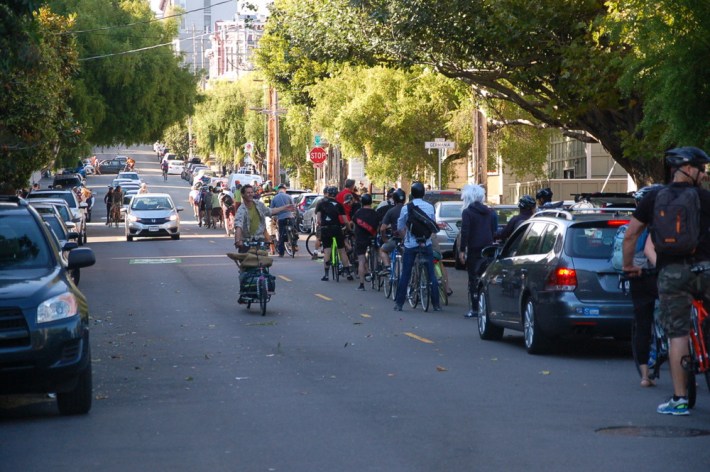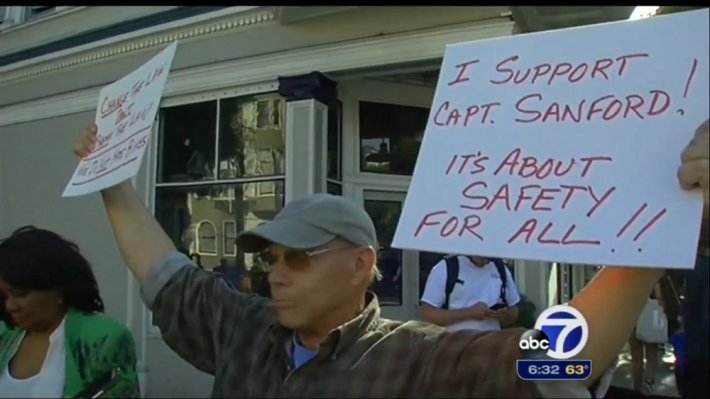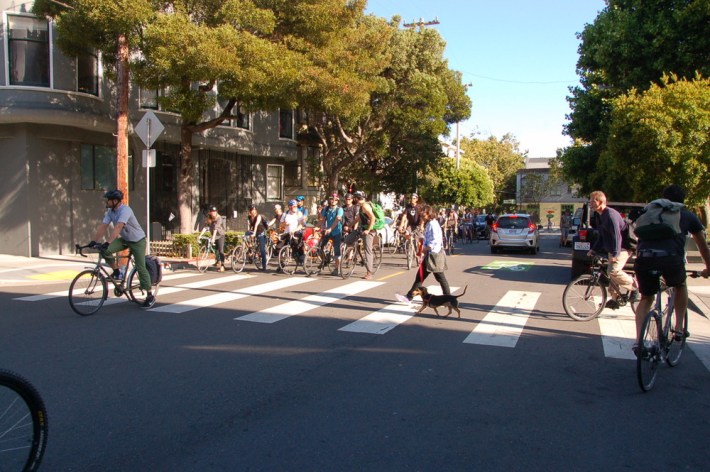
Countless bike commuters queued up for over a block yesterday to make a completely legal left turn on the Wiggle. As predicted, the demonstration showed the absurdity of how full compliance with the impractical stop sign law -- which makes no distinction between bikes and cars -- would actually play out.
The Wiggle "stop-in" was a response to calls for a crackdown on bike violations at stop signs from the new captain at SFPD's Park Station, John Sanford. Sanford insists that the vast majority of bicycle riders who safely slow down and yield to others' right-of-way should be ticketed, even as the most dangerous behaviors go under-enforced.
Cheryl Brinkman, a member of the SFMTA Board of Directors, was among the roster of city officials, bike advocates, and everyday people who turned out to take part in the exceptionally legal event.
"This is fun. This is civil obedience. This is street theater," said Brinkman. "And it's what San Francisco's good at."
"There's a big question of, 'does [the law] make sense?'" she said. "I firmly believe we should enforce dangerous behaviors. But I don't think enforcing behaviors that aren't hurting anybody is a good use of resources."
The message seemed to come across clearly to the news crews and bystanders. While the demonstration angered a few motorists, few people could be found voicing strong criticisms of the message of the protest.
John Schambre was out on the corner, holding up two signs that espoused contradictory messages. One supported adoption of the stop sign law used in Idaho, and the other supported Sanford's crackdown.
Schambre told Streetsblog that his vision is not the scene of civil obedience in front of him -- with cyclists lined up to make full stops and take turns proceeding, as the current law dictates. "This is ridiculous," he said. "This is a demonstration of unreality."
But when pressed to explain the difference between the demonstration, and how he thinks people on bikes should behave, he simply insisted that the volume of bike traffic is simply unrealistic.
People on bikes "should each take responsibility on a daily basis to stop at these stop signs, make sure there aren't any pedestrians, make sure there aren't any 2,000-pound vehicles ready to run them over," said Schambre. "The way I look at it, this problem wasn't created by pedestrians, it wasn't created by cars. It was created by bicyclists who refuse to obey the law and put all their energy into thwarting the law and protesting the law instead of getting the law changed."
That's just what the demonstrators were trying to achieve -- or, at least, getting police to follow their "Focus on the Five" campaign, which uses data to effectively guide traffic enforcement.
Morgan Fitzgibbons, one of the Wigg Party organizers, said the reaction to the event seemed overwhelmingly positive, save for a few drivers who became frustrated who honked and "peeled out" to drive away from the scene. Two car occupants got out of their car and "almost assaulted bicyclists" -- again, for obeying the law to a T.
Yesterday, Mayor Ed Lee said that he’s "not going to be bending to interests that simply want to disregard public safety," referring to the demonstrators.
"He simply doesn't understand what we're asking for," Fitzgibbons said, praising Supervisor London Breed for supporting the Idaho stop law.
While changing the law may be a daunting political challenge, Brinkman said, "Encouraging San Francisco to set enforcement priorities that reflect the reality of how people are moving around the city totally makes sense."
One middle-aged man was spotted walking his dog in a crosswalk at Waller and Pierce Streets, a block from the bike backup. As he entered the crosswalk, he entered the path of three people on bikes making a slow left turn after making a full stop. All parties paused, and the riders let the man walk by first.
That's the typical, uneventful example of how people on foot and bike negotiate their right-of-way. Whether the bicyclists made a full stop beforehand seems to be irrelevant.
I caught up with the man in the crosswalk, who declined to be named. When asked for his take on the demonstration, he said Sanford's crackdown was "ridiculous" when "there's so much more that the police could be concentrating on." SFPD should focus on driver violations like running red lights, he said, and noted the prevalence of pedestrians injured by drivers.
"As long as bikers are yielding the right of way, that's the important thing," he added. "No one is being hurt or imposed upon by a biker rolling through a stop sign."
"The transportation system is much more complicated than simply rules," said Joel Pomerantz, a local historian who hosts "Thinkwalks" tours on the Wiggle, and was one of the founders of Critical Mass.
In 1997, after Mayor Willie Brown and the SFPD attempted to end Critical Mass with a crackdown, Pomerantz said there was a "civil obedience" demonstration similar to yesterday's.
After taking his turn making a fully legal left at the stop sign at Steiner and Waller, Pomerantz said, "If the new police captain really wants us to follow the rules, well, that's what it looks like."
"We're trying so hard in the city to normalize bicycling," said Brinkman, "to bring people into the fold of calm cyclists who just ride for transportation because it's a great way to get around the city."
Sanford's focus on punishing normal, innocuous behaviors, she noted, doesn't just detract from the police's ability to stop behaviors that hurt people. The citations can also pose a serious financial burden.
"I know when I was young and uneremployed in the city, I couldn't afford a Muni Fast Pass," said Brinkman. "So for those cyclists who get ticketed for doing anything that was not necessarily unsafe... I imagine for a lot of those cyclists, those tickets really hurt. Those tickets can make the difference between a good month and a month when they were broke. That's not right."
Even Schambre, holding up his two perplexingly self-defeating signs, acknowledged that most people who bike through the Wiggle don't "sail through" and violate others' right-of-way.
"You know how that is," he said. "There can be 100 that obey the law, and if two don't, that's the headline."
See more coverage of the Wiggle "stop-in" from SF Weekly, ABC 7, the SF Chronicle, and NBC.







